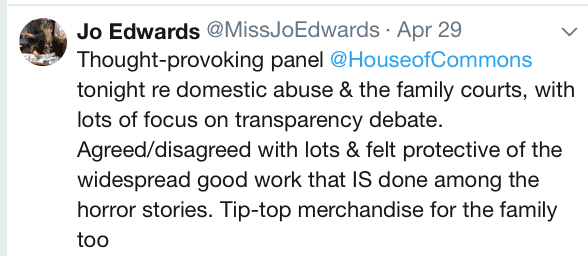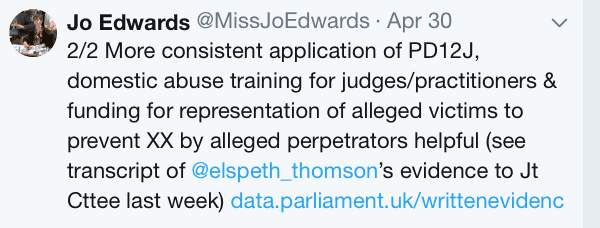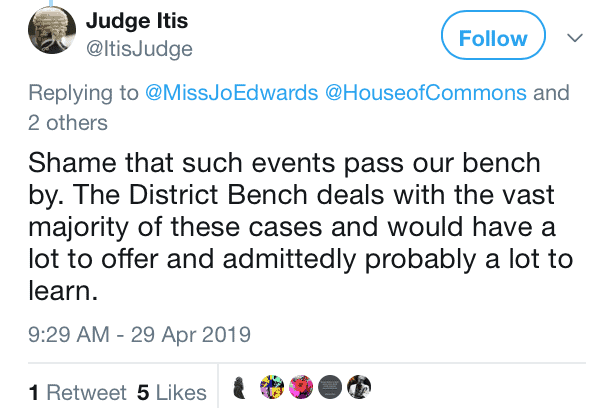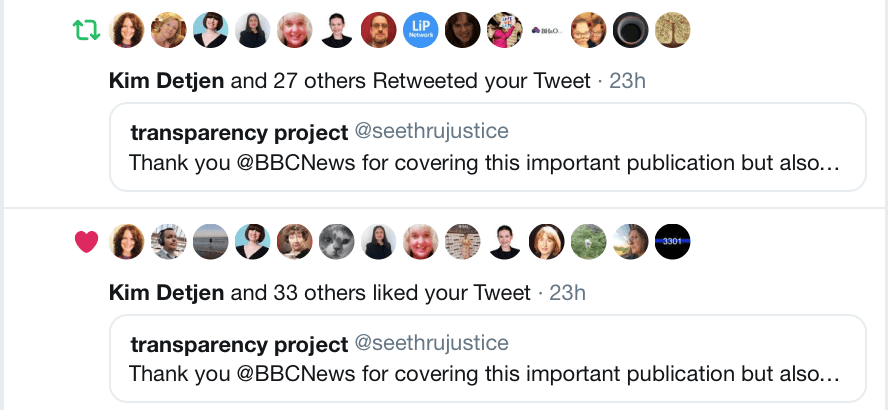Correcting, clarifying or commenting on media reports of family court cases
Explaining or commenting on published judgments of family court cases
Highlighting other transparency news
MEDIA (MIS)REPORTS OF FAMILY COURT CASES
Local news
Derbyshire Live and Nottinghamshire Live (Trinity Mirror Group) – Annie (pseudonym) responded to local news articles about Pause in response to Derbyshire council’s decision to commission the project. Pause for Thought highlighted the impact of such reports on women, and questioned gender assumptions and contraception requirements behind the Pause model from a birth parent’s perspective. The piece provoked much constructive comment and conversation. We aim to pull some of the threads together in a future post. See also BBC Radio 5 Live (2.25) featuring a birth parent and (unusually) a judge. (Annie is a project coordinator at the Transparency Project, runs the Surviving Safeguarding website, and is the parent’s representative on the Family Justice Council):
The Falmouth Packet (Newsquest Media Group) – This local news report also caught our attention for the sort of reporting that Level Up recently asked journalists / publishers to reflect on with the help of new guidelines, endorsed by press regulators Impress and IPSO, in the context of domestic homicide. Such as avoiding parroting defence solicitor arguments as the narrative or framing the ‘story’ round some sort of legitimising ‘trigger’ for violence / abuse that risks minimising it. (Here variously having “child contact issues” with an ex-partner who had been “being difficult” and having issues with the Children and Family Court Advisory and Support Service (CAFCASS), who told him that he had to provide proof he was not drinking or smoking cannabis by doing a test that would have cost £700).
The problem of parents (often men) being told certain assessments or tests are required to progress a family court application further but that there is no funding for those (otherwise prohibitively expensive assessments / tests) is, nevertheless, a very real one since since the government removed legal aid from most litigants, and arguably also warrants serious media investigation.
The Mirror – Repeated a misleading claim attributed to MP Louise Haigh, that the family courts currently operate a presumption that anyone who has fathered a child through rape should be encouraged to apply for access regardless of the risk they present. There is no such presumption or disregard for risk. It’s spin on the fact that Haigh and others are campaigning for a law change to end legal parental responsibility at the point of conviction for rape, which would also mean those men fell outside current procedural rules that say those with PR should have notice that any family court proceedings about their child have been issued (unless a court exceptionally dis-applies this, eg. because it would put a child – including through their carer – at too much risk). And for convicted rapist fathers who don’t have PR not to get notice even of care proceedings being issued by the state, unless there is some exceptional reason they should. Blog to follow on this and some other cases cited in the media recently in support of this campaign.
See also oral evidence to the House of Commons joint committee on the domestic abuse bill or watch on Parliament TV here. And tweets about a panel event on domestic abuse and the family courts last week at the House of Commons, organised by the Conservative party. Louise Tickle, journalist (also Transparency Project member) was on the panel. We’ve not seen any other information in the public domain from this event:



UPDATES
The Telegraph – Updated their headline and report following our tweet to them. There’s no reference to the piece having been edited (though the URL still shows the original misreport of a judge banging her head on the desk, as opposed to the hand stated by the judicial conduct office):
The Daily Mail (then others) –The press office for Gloucestershire responded to our enquiry, confirming that a serious case review has been conducted and will be published, saying delay to date relates to the criminal trial. (We featured national and local reports of the conviction and sentence of Sharon Lippett for shocking abuse of a former foster child she adopted aged 2, in last week’s Roundup). Public interest in how this could have happened remains high. Two members of Lippett’s household are still to be sentenced post conviction on 16th May. We don’t know whether appeals against conviction may be pending or not.
Care Appointments – We are enquiring about publication of the judgment from HHJ Atkinson’s family court findings, following this report at Care Appointments (featured in our last Roundup) and will update if and when we can.
Transparency Positive
Tortoise – Published the second in a series of in-depth reports by Polly Curtis, investigating separation of children from families by the state. ‘The Poor Parents’ focuses on complex links between poverty and child protection/removal, providing an accessible gateway for the wider public and links to other key reports such as the Care Crisis Review.
See also The State versus the family: Does the Government no longer trust parents? at Child Protection Resource on a recent Tortoise ‘Think In’. ‘Think-Ins’ are part of the Tortoise model of engaging with the sector/those affected to drive stories and choice of stories. The model is consistent also with the idea of a more mature, solutions focused journalism moving beyond highlighting problems to sharing responsibility both for some of the causes and the solutions. (See also point 8 of the Investigative Journalism Toolkit published by the Bureau of Investigative Journalism we highlighted back in our January 2019 Roundup):
Linker of the Week
BBC News – Hannah Richardson at BBC News reported the House of Commons Select Committee report Funding of local authorities’ children’s services, and provided a direct link to it for online readers. (Presumably not least because the committee ensured the press were not privileged with sight of it over the public through embargo and tailored press release as is all too common in order to control the narrative):

Linkless
The Guardian, Mirror and others – With the judgment from MSF (Appeal: Transfer of primary residence) back up at bailii.org.uk (apparently after corrections were made), we took the opportunity to post it in the Guardian Facebook comments section (though public attention had already largely moved on):
NEWLY PUBLISHED JUDGMENTS FOR EXPLANATION OR COMMENT
MFS (Appeal: Transfer of Primary Care) [2019] – We also explained and commented on the published judgment itself. See Alienating behaviours and appealing about an expert report from Julie Doughty:
IN OTHER TRANSPARENCY NEWS
Open justice, digital reform of the courts and access to justice
Responses to the House of Commons Justice Select Committee Inquiry on digital reform of the courts and access to justice – Our response (which comments on open justice, closed courts, virtual hearings and the impact of transparency on family cases) was published (with others) at the House of Commons site. See Written evidence to Commons Justice Committee’s Court and Tribunal Reforms inquiry by Paul Magrath:
Closed meeting between HMCTS and the Society of Editors -HMCTS announced the first of a series of closed meetings between HMCTS and the Society of Editors (who represent the interests of the media), that will ensure their views are represented in the HMCTS £1bn court and tribunal reform programme as it develops. The Transparency Project asked how claims of a serious focus on open justice in the public interest could be made in respect of a closed meeting, and where the specialist understanding / ambition for open justice regarding the family courts lay. See our January 2018 post on the background to the formation of the ‘HMCTS Media working group’:
The Courts and Tribunals (Online Procedure) Bill – The government announced The Courts and Tribunals (Online Procedure) Bill which will establish a judicially chaired committee tasked with developing new, simplified rules around online services in civil, family and tribunal proceedings. (See also the HMCTS December 2018 conference discussion with Professor Richard Susskind on digital court reform now out on podcast).
Some transparency amendments to the (non family) civil procedure rules – We flagged transparency related changes to Part 39 of the Civil Procedure Rules (CPR) and asked if they’d be coming to family proceedings any time soon. See Privacy and anonymity orders in civil litigation by Paul Magrath:
Transparency in procurement of children’s placements? – Martin Barrow highlighted a Children England suggestion in the newly published House of Commons Housing, Communities and Local Government Select Committee Inquiry report – for a national care bank to conduct procurement on behalf of all councils, on an open book basis for scrutiny (for as long as the open market, for profit model of placing vulnerable children at public expense continues). See Funding of local authorities’ children’s services and this twitter thread.
DIARY DATES
15th May 2019 (Bristol): Journalists and legal bloggers attending family courts: A workshop for lawyers – Lucy Reed (Chair of the Transparency Project) is delivering this workshop on behalf of the project in light of the Legal Blogging Pilot implemented through PD36J. The aim is to assist advocates to be ready to serve the interests of their clients whether parent, child or local authority, should a legal blogger (or journalist) attend a hearing they are instructed in. Information and booking for this free (donation only) event here:
27th September 2019 (London) – A Resolution professional development day for all family law professionals (particularly children practitioners) examining the dilemmas and benefits of more openness in family court proceedings. Designed and delivered by Lucy Reed, family barrister and chair of the Transparency Project and Louise Tickle, award-winning journalist writing on family law. Information and booking here:
Feature pic: Courtesy of Flickr Lauri Heikkinen via CreativeCommons licence – with thanks
